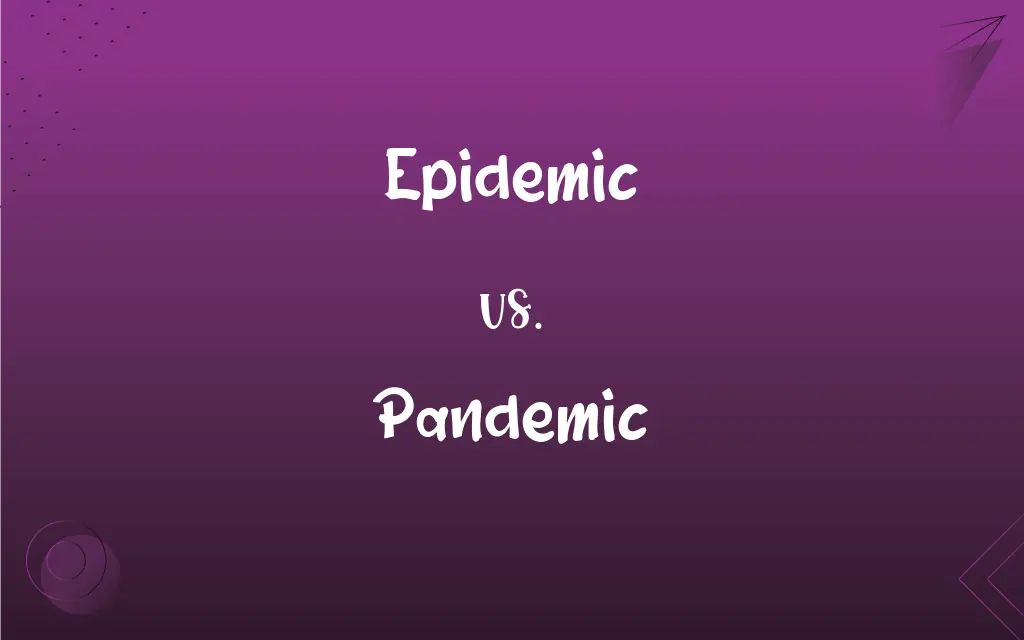Epidemic vs. Pandemic: What's the Difference?
Edited by Aimie Carlson || By Harlon Moss || Updated on October 6, 2023
An epidemic is a disease outbreak in a specific geographic area or population, while a pandemic is an epidemic that spreads across countries or continents.

Key Differences
Discussing the terminologies of "epidemic" and "pandemic" necessitates a fundamental understanding of their distinct implications in public health contexts. An epidemic refers to a sudden increase in the number of cases of a disease above what is normally expected in a particular geographic area or population. In contrast, a pandemic pertains to an epidemic that has spread over several countries or continents, affecting a substantial number of people with its widespread infiltration into various communities globally.
Delineating between an epidemic and pandemic also involves acknowledging the scale and impact of a disease outbreak. The notion of an epidemic is typically constrained to more localized or regionalized outbreaks, wherein a disease affects a significantly high number of individuals within a community, city, or region. On the other hand, a pandemic, such as the notable instance of COVID-19, transcends borders and geographical confines, marking a global health crisis that affects populations on a multinational scale.
In the realm of epidemiology, both epidemic and pandemic events serve as critical points for intervention and management from public health organizations. An epidemic, given its relatively localized nature, may require targeted health interventions, public awareness campaigns, and possibly local quarantine measures to control its spread. Inversely, managing a pandemic demands a more coordinated global response, entailing international cooperation, widespread vaccination campaigns, and universally adhered-to health guidelines to mitigate its expansive and pervasive impact.
While both epidemic and pandemic situations necessitate robust public health responses, the nature and scope of these responses are heavily influenced by the scale and reach of the outbreak. In an epidemic, healthcare responses might be focused and intensified in the affected locale, engaging in meticulous contact tracing and localized health service provision. In contrast, a pandemic necessitates broad-scale strategies, including international travel regulations, global resource allocations, and worldwide scientific collaboration to devise universally applicable health solutions and preventative measures.
Understanding the social and economic repercussions is also vital when differentiating between an epidemic and a pandemic. An epidemic, while capable of imposing substantial strain on local health services and economies, generally possesses a comparatively localized socio-economic impact. Contrastingly, a pandemic can destabilize global economies, disrupt international travel, and necessitate widespread societal adjustments, as witnessed in the global impacts brought about by the COVID-19 pandemic, profoundly affecting myriad aspects of daily life across numerous countries.
ADVERTISEMENT
Comparison Chart
Geographical Spread
Localized to a specific area or population
Extends across countries or continents
Impact Scope
Often affects a city, region, or specific group
Impacts multiple countries, often globally
Public Health Response
Typically local or regional interventions
Requires international collaboration and response
Socio-economic Impact
Generally localized impacts
Can cause widespread global economic and social disruptions
Example
The Zika virus epidemic in Brazil in 2015-2016
The COVID-19 pandemic starting in 2019
ADVERTISEMENT
Epidemic and Pandemic Definitions
Epidemic
The term epidemic describes a sudden surge in disease cases within a specific population or area.
Health officials are working to contain a measles epidemic in the region.
Pandemic
Pandemic refers to a disease prevalent over an entire country or the world.
The 1918 influenza pandemic resulted in millions of deaths globally.
Epidemic
An epidemic indicates a conspicuously higher than expected occurrence of a particular disease in a given area.
The country faced a cholera epidemic due to contaminated water sources.
Pandemic
When a disease extends beyond borders affecting multiple countries, it becomes a pandemic.
The Black Death was a pandemic that devastated Europe in the 14th century.
Epidemic
When a specific disease markedly affects a geographic area or population, it is termed an epidemic.
The government is taking steps to control the dengue epidemic in the coastal areas.
Pandemic
A pandemic denotes a global outbreak of a disease.
The COVID-19 pandemic affected individuals and economies worldwide.
Epidemic
Epidemics are characterized by a noticeable increase in disease incidence within a confined locale.
The rapid spread of mumps among schoolchildren in the district was declared an epidemic.
Pandemic
The term pandemic designates a disease that affects people globally or across continents.
The H1N1 pandemic in 2009 spread rapidly to various countries.
Epidemic
An epidemic is an outbreak of a disease occurring on a local or regional scale.
The city has been grappling with a severe flu epidemic this winter.
Pandemic
A pandemic implies an epidemic occurring on a worldwide scale crossing international boundaries.
The HIV/AIDS pandemic has had a profound global impact since the late 20th century.
Epidemic
Spreading rapidly and extensively by infection and affecting many individuals in an area or a population at the same time
An epidemic outbreak of influenza.
Pandemic
Widespread; general.
Epidemic
Widely prevalent
Epidemic discontent.
Pandemic
(Medicine) Epidemic over a wide geographic area and affecting a large proportion of the population
Pandemic influenza.
Epidemic
An outbreak of a contagious disease that spreads rapidly and widely.
Pandemic
A pandemic disease.
FAQs
Are there standard global protocols for managing a pandemic?
While there are global guidelines, precise protocols might vary since countries may implement different strategies based on their situations.
What determines the end of a pandemic?
A pandemic is generally considered over when the disease is no longer spreading widely and globally.
Are there severity levels to pandemics?
Yes, the WHO has defined phases and severity levels for pandemics, particularly for influenza.
How is the public informed during an epidemic?
During an epidemic, public health agencies typically communicate risks, prevention measures, and updates through various media.
How does an epidemic affect healthcare systems?
An epidemic can strain healthcare systems, as there may be increased demand for medical services, supplies, and healthcare personnel.
What is an example of a recent pandemic?
The COVID-19 outbreak, which began in late 2019, is a recent example of a pandemic.
Can a disease be endemic and also cause epidemics?
Yes, a disease can be endemic in a region and occasionally flare-up, causing epidemics.
What are social implications during a pandemic?
A pandemic can lead to social implications like isolation due to quarantine, travel restrictions, and economic strain.
Is duration considered when classifying an epidemic or pandemic?
Duration isn’t a primary factor; it’s more about geographic spread and case numbers.
Can there be an epidemic within a pandemic?
Yes, there can be a localized epidemic (like a dengue outbreak) occurring during a pandemic (like COVID-19).
Can an epidemic affect multiple countries without being a pandemic?
Generally, no. When an epidemic affects multiple countries, it is often on the path to or classified as a pandemic.
What was the 1918 Spanish Flu?
The 1918 Spanish Flu was a devastating pandemic that affected a third of the world’s population.
Does a disease have to be fatal to be considered an epidemic?
No, an epidemic refers to a significant, sudden increase in cases, not necessarily fatal.
How does herd immunity affect an epidemic?
Herd immunity, once achieved, can slow or stop the spread of disease, potentially ending an epidemic.
What defines an epidemic?
An epidemic is defined by an unexpected increase in illness cases within a particular geographic location or population.
How does a pandemic differ from an epidemic?
A pandemic is an epidemic that has spread over multiple countries or continents.
Can an epidemic become a pandemic?
Yes, if an epidemic spreads across countries and affects a large number of people, it may be classified as a pandemic.
What role does World Health Organization (WHO) play in classifying pandemics?
The WHO assesses and declares a situation as a pandemic, often mobilizing global health responses.
How does vaccination influence a pandemic’s course?
Widespread vaccination can slow or stop a pandemic by reducing the number of susceptible individuals.
How does public health response differ between an epidemic and pandemic?
An epidemic might involve localized health responses, while a pandemic requires coordinated international public health efforts.
About Author
Written by
Harlon MossHarlon is a seasoned quality moderator and accomplished content writer for Difference Wiki. An alumnus of the prestigious University of California, he earned his degree in Computer Science. Leveraging his academic background, Harlon brings a meticulous and informed perspective to his work, ensuring content accuracy and excellence.
Edited by
Aimie CarlsonAimie Carlson, holding a master's degree in English literature, is a fervent English language enthusiast. She lends her writing talents to Difference Wiki, a prominent website that specializes in comparisons, offering readers insightful analyses that both captivate and inform.































































